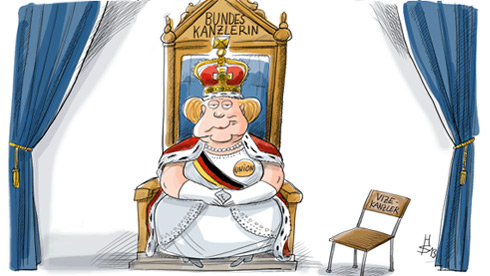“Angela Merkel knocks out her political rivals,” writes Rzeczpospolita. In its editorial, the daily remarks that “the most important woman in the world” now has a third term to show how will she use Germany’s exceptional strength in the EU.

The third term is a chance to show what German hegemony is all about. Will it revert to the pro-European tradition of former chancellors or will it come dangerously close to a vision lambasted by the banners seen in Greek demonstrations, where Merkel is shown with a Führer’s mustache […] It is up to Angela Merkel to miraculously restore the attractiveness of the EU for future generations.
Angela Merkel has “triumphed”, but her “victory entails responsibility”, writes Les Echos in Paris. In the wake of a campaign that was “short on details”, what will the Chancellor do? wonders the daily —
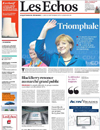
The answer will depend in part on the Chancellor’s capacity to rule alone or with the social democrats. On this subject, the Elysée, which had long hoped for a win by Angela Merkel’s adversaries followed by a grand coalition that would keep her on a tight rein, has suffered a setback. [...] With regard to external relations, Berlin can no longer content itself with speeches that are as vague and hollow as they are generous on the organisation of Europe. It is on these conditions that Angela Merkel will be included on the list of chancellors that have made their mark in history.
“Merkel wins hands down”, headlines La Stampa, which hails the “overwhelming support” for the Chancellor’s party. The vote for the CDU in tandem with the SPD’s good showing – and the exclusion of AfD and the Greens – stands out in contrast to the crisis suffered by traditional parties throughout the rest of Europe. In the future —
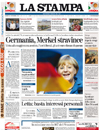
… there will be no deviation from the political, economic and financial strategy, which has been employed up till now by Germany. Regardless of what Steinbrück says, the Social Democrats do not have alternative ideas or the will to push them through. The key outcome of yesterday's election is that in Germany there is no alternative to the policies implemented by Merkel in recent years. Authoritative voices that are raised in response will have to come from Europe.
From now on, announces El Periódico's headline, Angela Merkel has “Europe at her feet”. The Barcelona daily notes that the Chancellor —
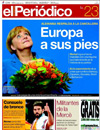
… is the survivor of a crisis that brought down Sarkozy, Zapatero, Sócrates, Monti and Berlusconi [...] For Europe, one thing is clear. From now on, with no election dates on the horizon, we will see a chancellor who is much more prepared to take decisions. However, what these decisions will be and what direction they will take remains to be seen, even if she has already said no to Eurobonds and collectivising debt. Will she want to lead Europe, and will she want a German Europe or a European Germany?
Leading with the headline “Merkel hails ‘super result,” The Financial Times nonetheless warns against high expectations. For columnist Wolfgang Münchau, coming within a few votes of an absolute majority was “the best conceivable result Angela Merkel could have had,” but it is unlikely to pave the way for radical change —

She will stay in power – of that there was really never any doubt. But she also secured her other goal – to make it impossible for the three parties of the left to form a coalition against her during the next parliamentary term. The Germans will thus get what they wanted: a broad-based coalition with a non-visionary leader. Only a fool would think that the elections would free the German chancellor from making a big leap and agree to resolve the crisis once and for all. After the election is not going to feel much different from before the elections.
But after all, as Volkskrant points out Angela Merkel’s main merit has been to channel tensions in Europe —
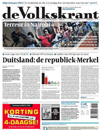
Merkel has been the cork in the bottle with regard to tensions and populist powers in Europe. While politics has become less stable in the Netherlands, in Germany, Merkel has continued to exude a sense of calm. And that is how she tackles problems: dealing with them step by step.
In Greece, one country where the German election results have been the subject of much trepidation, the website of weekly To Vima remarks —

The Germans have voiced a resounding yes to the sovereignty of their country in Europe: a sovereignty that will be built on the ruins of what was once the southern part of a “united” continent. It was obvious and predictable: with her policy on the debt crisis, Angela Merkel not only dragged a large part of Europe to the brink of disaster, she also enabled Germany to swallow Europe whole. [...] Once again, false hopes have been brought back to earth in Athens. From the first opportunity, Merkel has clearly made it known that there will be no let-up in the pressure on Greece.
Was this article useful? If so we are delighted!
It is freely available because we believe that the right to free and independent information is essential for democracy. But this right is not guaranteed forever, and independence comes at a cost. We need your support in order to continue publishing independent, multilingual news for all Europeans.
Discover our subscription offers and their exclusive benefits and become a member of our community now!










